Teas Good for Congestion: Natural Remedies for Relief

Overview
If you're struggling with congestion, there are several soothing teas that can help you find relief. Peppermint, licorice root, ginger, thyme, chamomile, echinacea, green tea, marshmallow root, slippery elm, and lemon tea each offer unique benefits for your respiratory health. Imagine sipping on a warm cup of chamomile after a long day; it can not only comfort you but also alleviate your symptoms.
These teas work wonders in various ways. They can reduce inflammation, soothe irritated mucous membranes, and even boost your immune system. Each sip is a gentle reminder that nature provides us with effective remedies for congestion. Have you ever noticed how a warm drink can make you feel instantly better? It's the magic of these natural ingredients at work.
As you explore these options, consider how each tea can fit into your daily routine. Whether you prefer the refreshing taste of peppermint or the calming effect of chamomile, there’s a tea that can support your wellness journey. Why not take a moment to discover which one resonates with you? Embrace the power of these natural remedies and nurture your body with the goodness they offer.
Introduction
In the quest for natural remedies to combat congestion and support respiratory health, herbal teas emerge as powerful allies. Imagine sipping a warm cup of peppermint or chamomile tea, feeling its soothing properties wash over you. From the immune-boosting effects of echinacea to the refreshing zest of lemon, each tea offers unique benefits that can enhance your overall well-being.
This article delves into the remarkable properties of various herbal teas, highlighting their roles in alleviating respiratory discomfort and promoting wellness. Have you ever wondered how these delightful brews can fit into your health routine? Readers will discover not only how to prepare these comforting infusions but also the scientific backing that underscores their effectiveness, making them essential additions to any health-conscious lifestyle.
Whether you’re seeking relief from a cold or simply looking to bolster your immunity, these herbal infusions promise to invigorate the body and soothe the spirit. So, why not explore the world of herbal teas and find the perfect blend for your wellness journey?
Peppermint Tea: A Natural Decongestant
Peppermint tea is well-known for its menthol content, which plays a vital role in easing breathing issues. Menthol acts as a natural muscle relaxant, helping to open up nasal passages and alleviate congestion caused by colds or allergies. This soothing effect not only facilitates easier breathing but also diminishes sinus pressure, making peppermint tea an excellent choice for those seeking relief.
Recent studies, including a randomized, double-blind, placebo-controlled trial involving 80 participants, have highlighted the effectiveness of peppermint tea in enhancing lung function. Participants in this trial reported significant improvements in their symptoms after enjoying peppermint tea, underscoring its potential as a natural remedy.
In addition to its respiratory benefits, peppermint tea is also celebrated for its positive effects on digestion and focus, making it a versatile addition to your wellness routine. To elevate your experience, consider combining it with Gardenika's Ayurvedic Detox Blend, which features organic lemongrass, echinacea, and dandelion to support immune function and promote digestive wellness. This herbal tisane is crafted from certified organic ingredients, ensuring a pure and natural experience in every cup.
To prepare peppermint tea, simply steep fresh or dried peppermint leaves in hot water for 5-10 minutes. The fragrant benefits, paired with its healing qualities, make peppermint tea one of the best options for congestion. As health professionals recommend, pay attention to how you feel after consuming peppermint tea, as its effects can be notably beneficial within an hour of intake. Furthermore, ongoing research is essential to explore the protective effects of tea consumption across diverse populations, enriching our understanding of its benefits.

Licorice Root Tea: Soothing Respiratory Relief
Licorice root tea is a cherished traditional remedy known for its soothing ability to calm sore throats and reduce airway inflammation. Its demulcent properties create a gentle protective layer over mucous membranes, effectively easing irritation and discomfort. Research, including a clinical trial registered at clinicaltrials.gov (NCT 02968823) on November 16, 2016, shows that licorice root can significantly alleviate sore throat symptoms, making it a comforting option for those facing breathing difficulties.
To prepare this nurturing tea, simply simmer the root in water for about 10 minutes. Not only does this tea help alleviate congestion, but it also promotes overall breathing wellness, making it a wonderful addition to your wellness routine. As Sneha Das beautifully notes, 'Drinking licorice root tea helps to reduce minor irritation and soothe a sore throat.'
Moreover, animal studies suggest that glycyrrhizin extract from licorice root may provide relief from asthma when combined with modern treatments. Case studies have also indicated that herbal interventions, including licorice, effectively reduce sore throat symptoms, reinforcing the idea that these teas are beneficial for congestion and respiratory health.
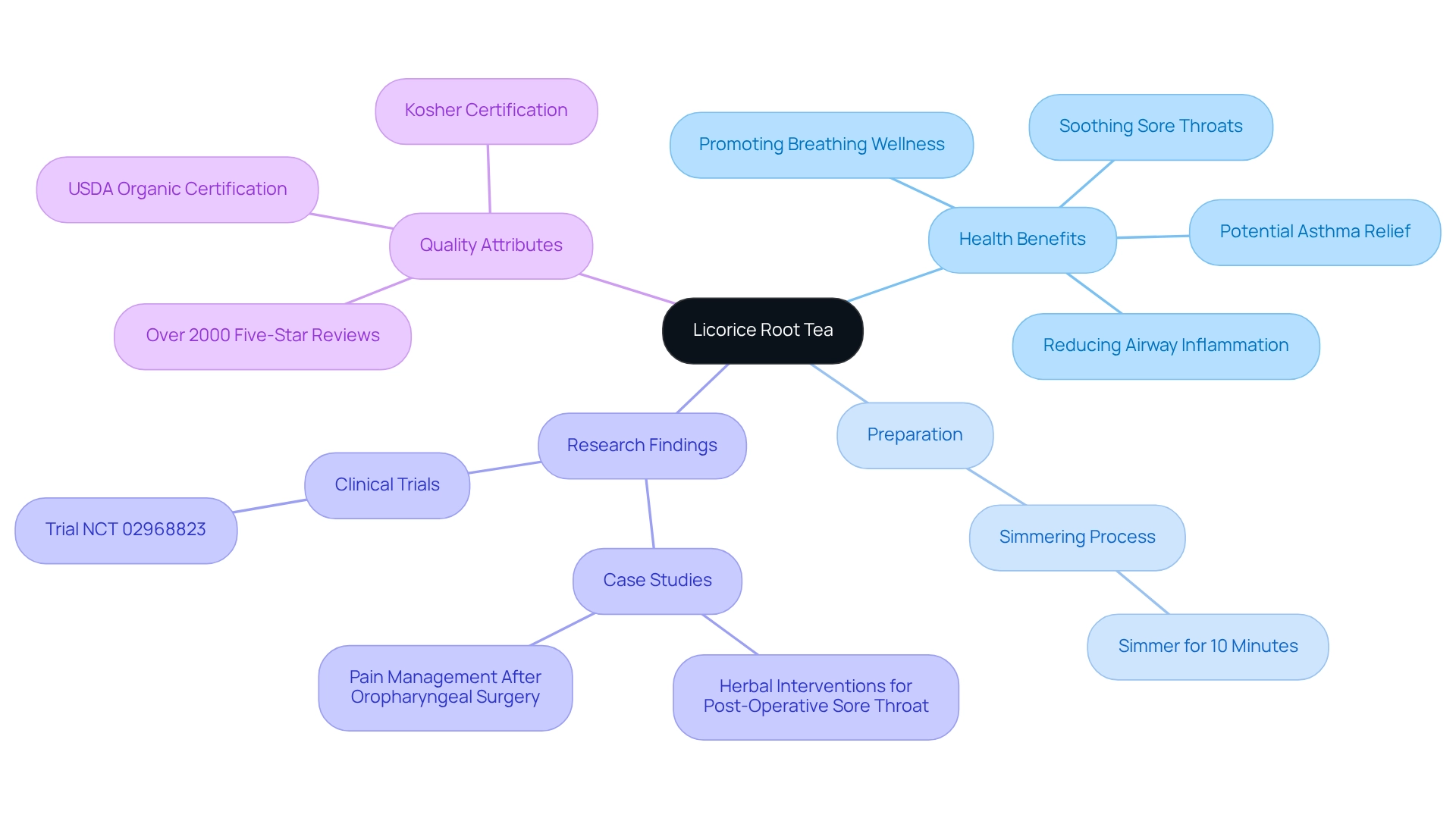
Ginger Tea: Anti-Inflammatory Benefits
Ginger tea is truly a powerhouse of gingerols, compounds celebrated for their remarkable anti-inflammatory properties. These compounds are essential in alleviating airway swelling and congestion, making ginger tea one of the best options for those seeking relief in their breathing passages. Research indicates that ginger can significantly reduce inflammation, with studies revealing an impressive 70% relaxation in airway smooth muscle strips treated with ginger after just 30 minutes. This underscores ginger's potential in promoting respiratory health.
To prepare ginger tea, simply slice fresh ginger and steep it in boiling water for 10-15 minutes. Fresh ginger, with its thin skin and mild flavor, is best utilized in this way to maximize its nutritional advantages. For added benefits, consider incorporating honey, which not only enhances the flavor but also contributes soothing properties. Recent research highlights the efficacy of ginger tea in alleviating airway swelling, reinforcing its status as a natural solution for individuals looking for relief from congestion.
Moreover, ginger's anti-inflammatory properties extend beyond respiratory wellness. A case study on ginger's effect on joint conditions reveals its potential in reducing joint inflammation and discomfort, particularly for arthritis patients. While results can vary, the possible advantages of ginger are evident, justifying further investigation in clinical trials. Dr. Alison Rinderspracher emphasizes the importance of understanding the chemical composition and active sites of ginger components, which further supports its medicinal uses.
As we approach 2025, the ongoing exploration of ginger tea's wellness advantages continues to affirm its role as one of the best teas for congestion and inflammation. With its rich history in traditional medicine and growing scientific support, ginger tea stands out as a vital addition to any wellness routine. Additionally, consider exploring Gardenika's Organic Anti-Inflammatory Loose Leaf Tea, which beautifully combines the ancient wisdom of Ayurveda with ginger and turmeric, offering a holistic approach to wellness with every soothing sip.
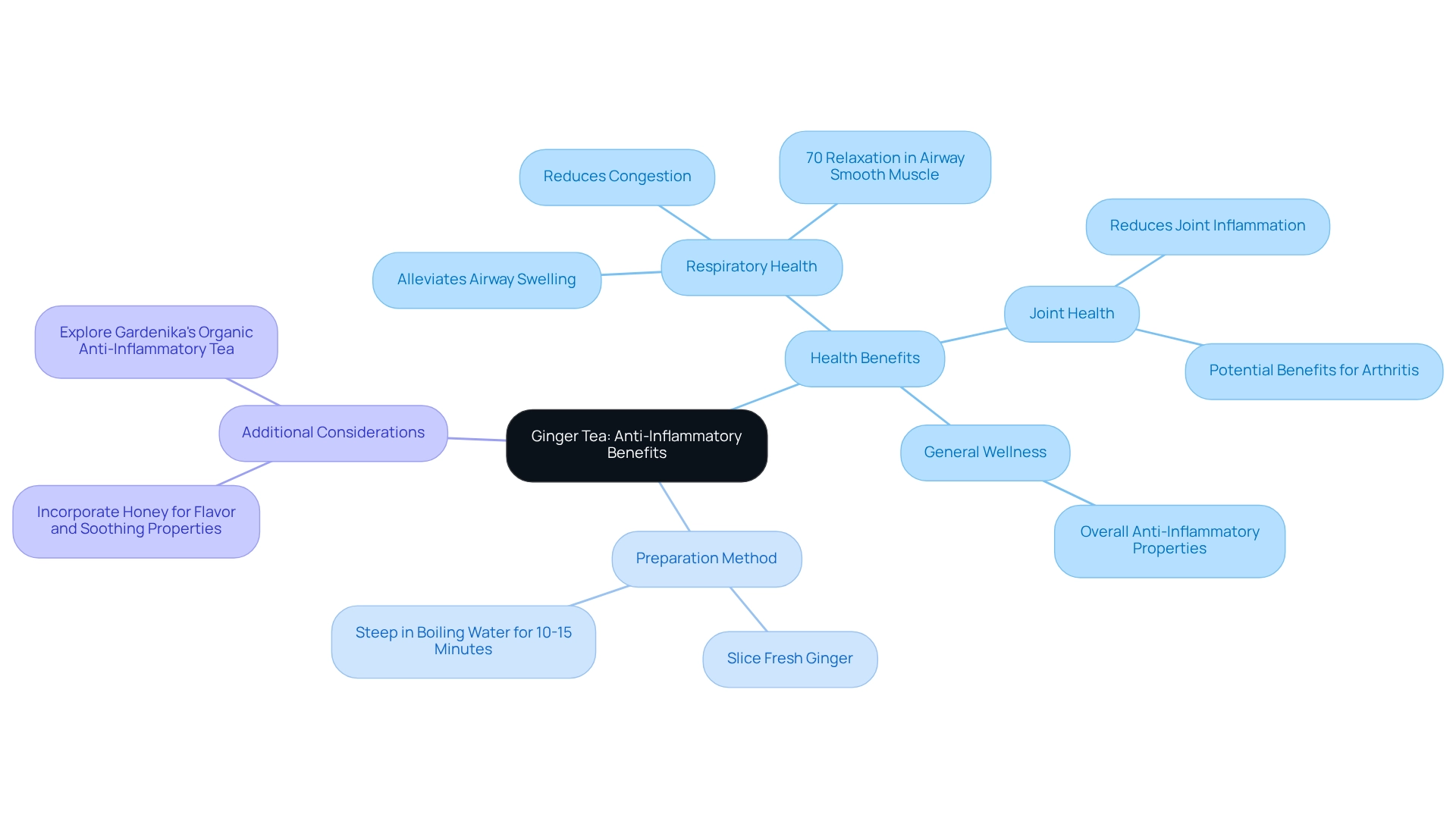
Thyme Tea: Antimicrobial Support for Congestion
Thyme tea is not only aromatic but also rich in thymol, a potent compound known for its antimicrobial properties. Did you know that studies show thymol can be four to eight times more potent than conventional therapeutic medications against specific pathogens, especially Cryptococcus? This makes thyme tea an excellent choice for congestion and a beneficial ally in fighting infections.
To prepare thyme tea, simply steep fresh or dried thyme leaves in hot water for about 10 minutes. This soothing infusion helps clear mucus and provides relief from discomfort, making it one of the teas good for congestion. Moreover, thyme's antibacterial characteristics have been thoroughly documented, highlighting its role in tackling respiratory issues and enhancing overall respiratory well-being.
As Mohammed Sabah beautifully stated, "One of the significant medicinal plants is the thyme plant which possesses numerous advantages that address various medical conditions." Beyond its health benefits, thyme also acts as a natural preservative, protecting food from bacterial contamination and spoilage. Recent formulations of thyme oil, such as nano-emulsions, have demonstrated excellent fungicidal activity against various pathogenic fungi, underscoring thyme's modern significance in wellness.
Lastly, different cultivars of thyme, such as 'Deutscher Winter' and 'Słoneczko,' offer varying stability and yield, impacting the quality of thyme used in tea production. Explore the wonderful world of thyme tea and discover how it can support your health and well-being.
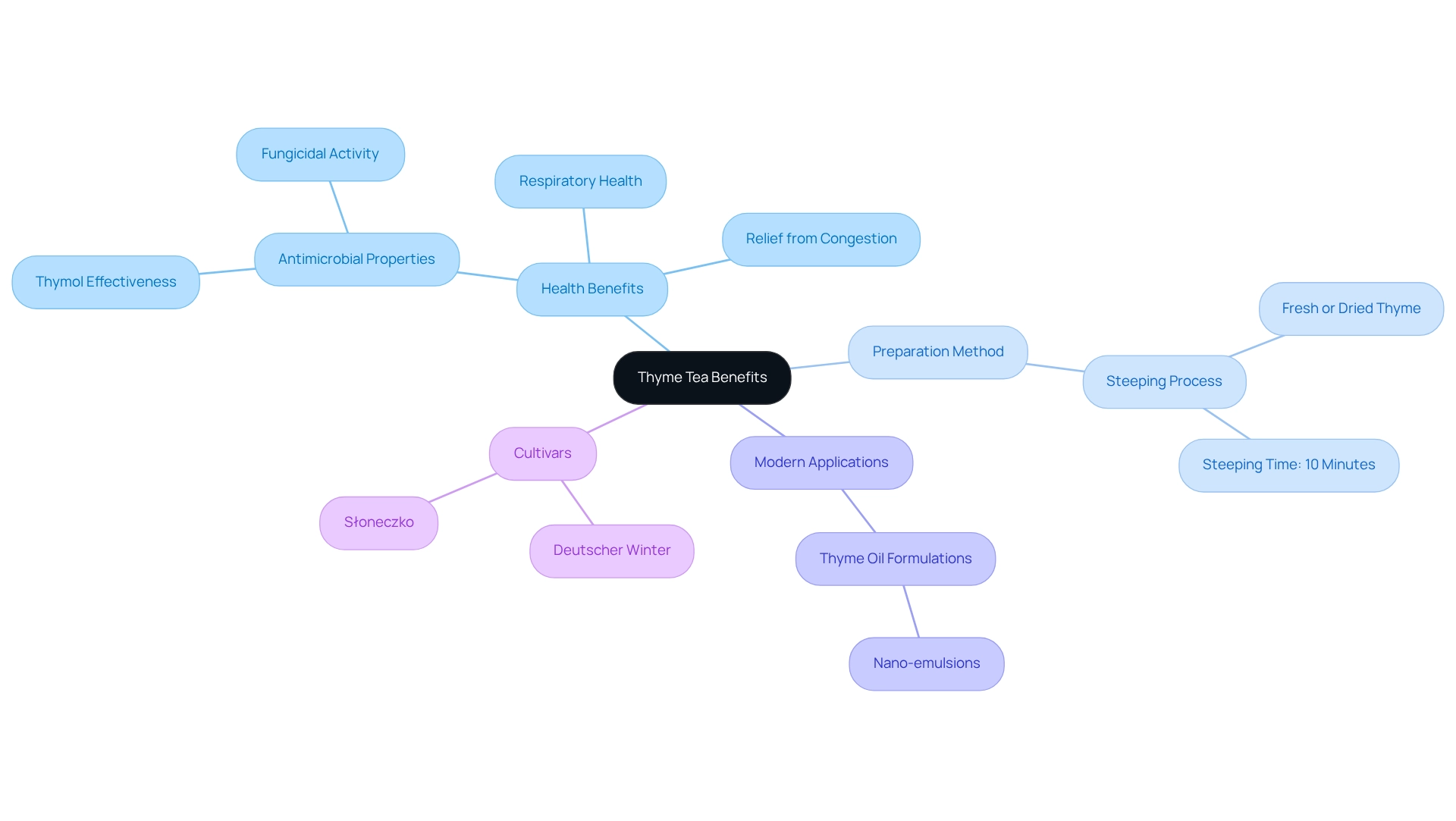
Chamomile Tea: Calming and Congestion-Relieving
Chamomile tea is cherished for its calming properties, making it one of the best choices for relieving congestion and stress. Research indicates that teas beneficial for congestion, like chamomile, with their gentle anti-inflammatory qualities, can significantly aid in easing breathing difficulties. A recent narrative review highlighted chamomile's active compounds, which are linked to its ability to reduce inflammation, thus supporting lung function and confirming chamomile's status as a top tea for congestion. This review also pointed out the variability in preparation methods, emphasizing the need for consistency to achieve optimal results.
To prepare chamomile tea, simply steep dried chamomile flowers in hot water for 5-10 minutes. This soothing drink can be especially helpful when enjoyed before bedtime, promoting relaxation and enhancing breathing. Recent studies underscore the calming benefits of chamomile tea, with experts affirming that it not only improves sleep quality but also stands out among the teas good for congestion, making a meaningful contribution to lung health and overall wellness. At Gardenika, our organic loose leaf chamomile tea is crafted with time-honored herbs, designed to bring balance and wellness into your life. Discover the unique advantages of our blend and find harmony with our organic loose leaf teas.
Moreover, case studies have demonstrated chamomile's effectiveness in alleviating symptoms like mucositis and dermatitis, showcasing its broader anti-inflammatory properties. These findings reinforce that chamomile is indeed one of the teas good for congestion, highlighting its potential to ease breathing discomfort as well. Expert Abbas Mardani noted that the authors received no financial support for the research, further enhancing the credibility of the results.
With its unique blend of soothing effects and wellness benefits, chamomile tea is a wonderful choice for congestion relief. For the best experience, consider enjoying a cup of Gardenika's organic chamomile tea in the evening to foster relaxation and support your lung health. Shop now for Gardenika's organic chamomile tea and embrace the soothing power of nature.
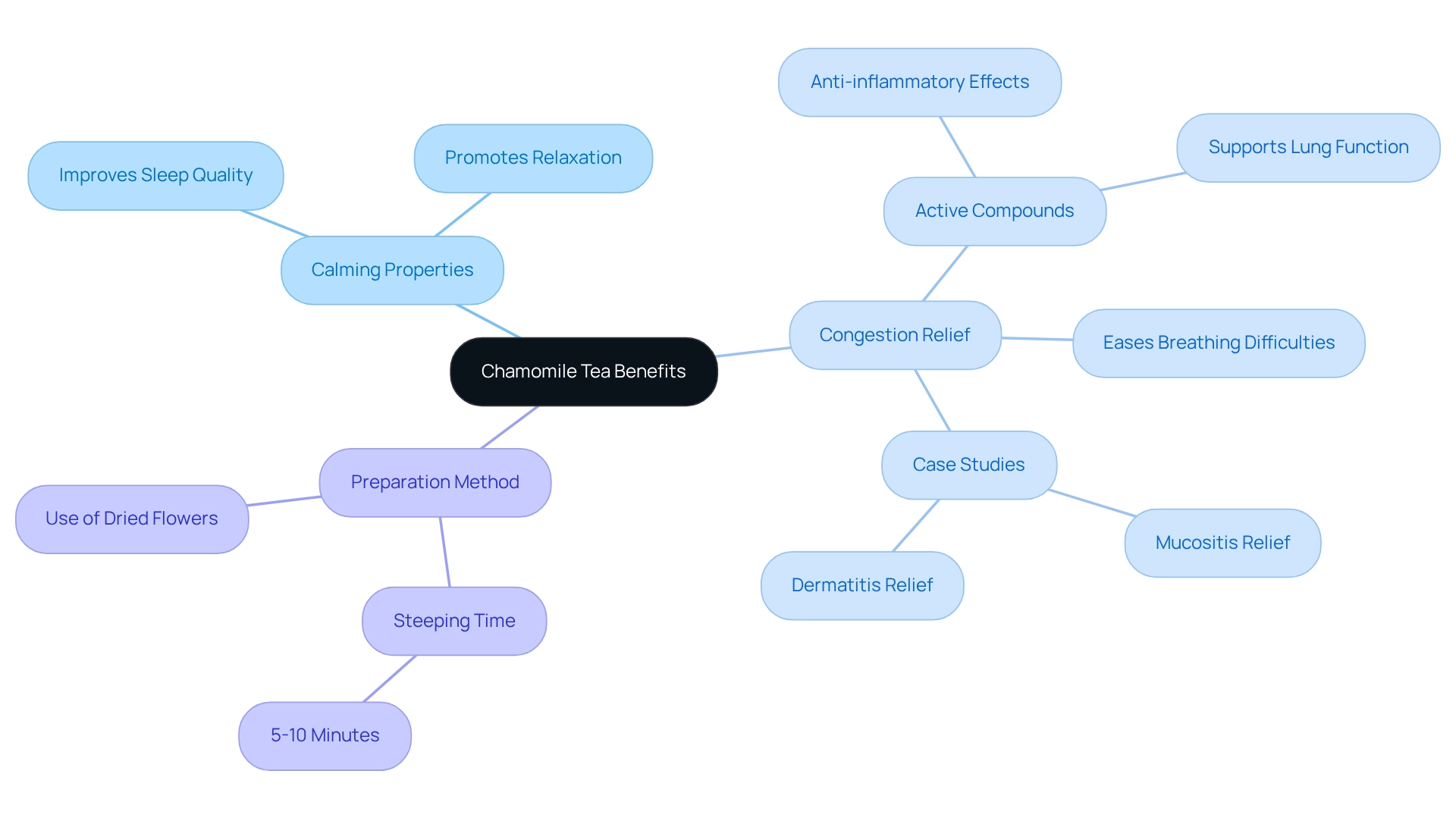
Echinacea Tea: Immune Support During Congestion
Echinacea tea is truly celebrated for its powerful immune-boosting properties, making it an excellent choice during the cold and flu season. Did you know that research shows echinacea can notably reduce the risk of upper airway infections (URTIs) by 58%? It can also shorten their duration by an average of 1.4 days, making it a valuable ally in combating congestion and respiratory discomfort, especially when paired with other teas good for congestion.
A study titled "Echinacea Products Prevent or Treat URTI in Adults" reviewed various clinical trials and found that echinacea supplementation effectively reduces the risk of catching a cold and shortens its duration. This supports its use as a preventive measure against URTIs, helping you feel more at ease during those chilly months.
To prepare echinacea tea, simply steep the dried flowers or roots in hot water for 10-15 minutes. This allows the beneficial compounds to infuse fully, providing essential support when facing seasonal illnesses. Incorporating teas good for congestion into your wellness routine can help alleviate symptoms and promote recovery, nurturing your body when it needs it most.
Gardenika's organic loose leaf echinacea tea is crafted with time-tested herbs, designed to enhance your body's natural processes and promote holistic wellness. Unlike other choices, Gardenika's echinacea tea is specifically tailored to maximize these advantages, making it a wonderful addition to your health journey.
However, it's important to remain informed. As Dr. Craig I Coleman notes, "Much more work needs to be done to elucidate the safety of prolonged therapy since its effect on the rate-corrected QT interval, blood pressure, and other safety parameters is not well known." This highlights the significance of being mindful while appreciating the benefits of echinacea.
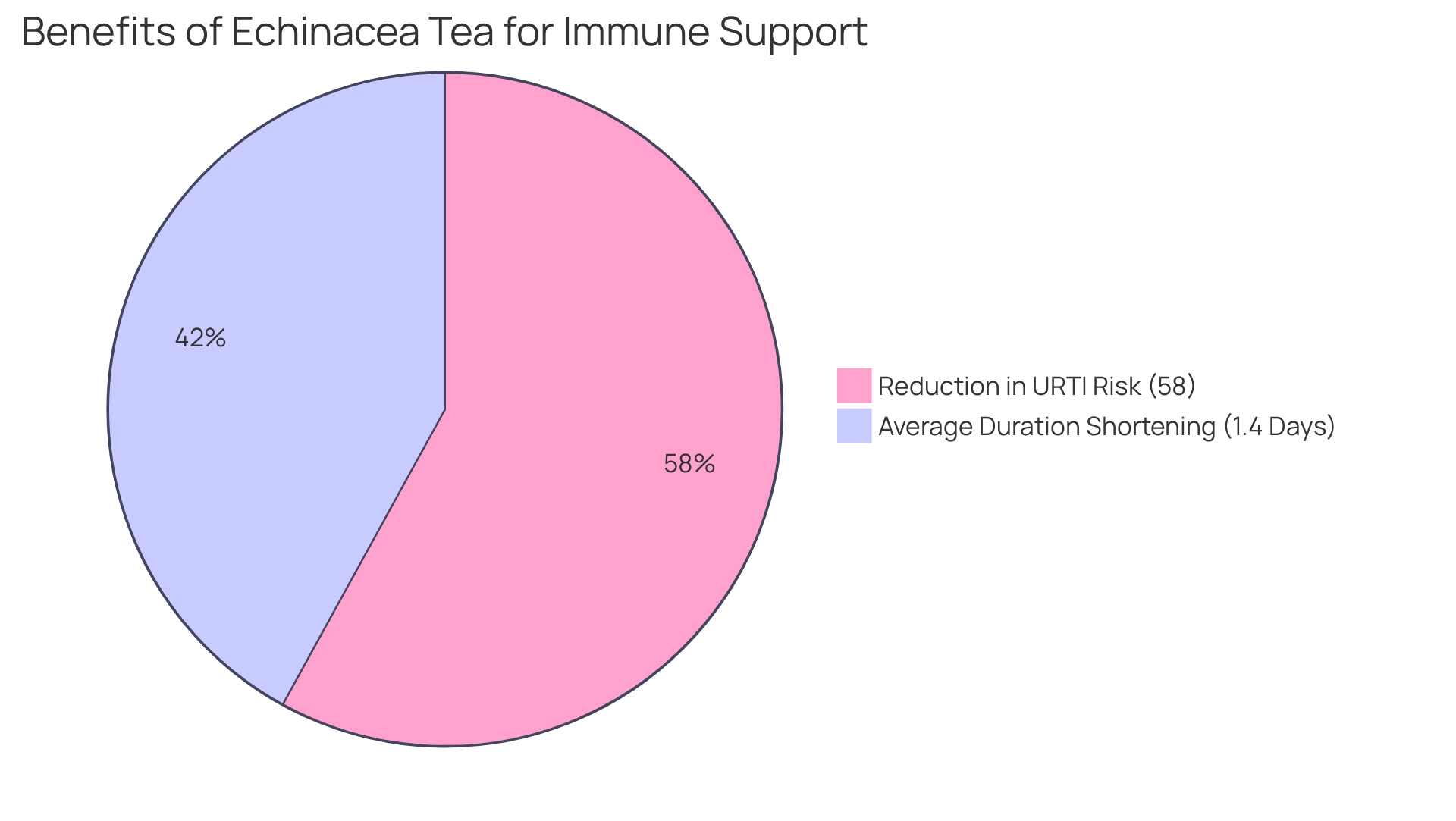
Green Tea: Antioxidant-Rich Relief
Green tea is a powerhouse of catechins, potent antioxidants known for their ability to combat inflammation and bolster the immune system. Research suggests that drinking three to five cups of green tea each day—about 24 to 40 ounces—can greatly enhance general well-being, especially since green tea is considered one of the teas good for congestion. The antioxidants in green tea, particularly epigallocatechin gallate (EGCG), have been shown to lower inflammatory markers, which is vital for respiratory health. For instance, a study demonstrated that green tea extract effectively inhibited STAT-1 activation, a key player in inflammatory responses, in animal models.
Normal hsCRP levels are less than 0.55 mg/L in men and less than 1.0 mg/L in women, while normal fibrinogen levels range from 200 to 300 mg/dl. Maintaining these levels is essential for managing inflammation, and incorporating green tea into your diet may help achieve this balance. As Kris Gunnars, BSc, observes, "Consuming green tea offers numerous advantages. It is rich in antioxidants, which may aid in preventing or addressing cellular damage and enhance your overall well-being."
For those seeking a holistic approach to wellness, Gardenika's Ayurvedic Detox Blend offers a complementary option. This herbal infusion merges organic lemongrass, echinacea, and dandelion, each providing distinct advantages that encourage a sound mind and body while supplying immune assistance. Lemongrass aids digestion, echinacea enhances immune function, and dandelion supports detoxification. Additionally, this blend is caffeine-free, making it an excellent choice for any time of day. To prepare a soothing cup, steep green tea leaves in hot water for 2-3 minutes. Enhancing the flavor with a splash of lemon not only makes it more enjoyable but also boosts its health benefits. For added variety, consider incorporating green tea into smoothies or using it as a base for iced teas. By integrating green tea and Gardenika's Ayurvedic Detox Blend into your daily routine, you can provide a natural remedy for congestion and discover teas good for congestion while supporting your immune system and promoting overall wellness. Plus, the eco-friendly loose-leaf format minimizes waste and maximizes flavor, ensuring each brew is as fresh and flavorful as the last.
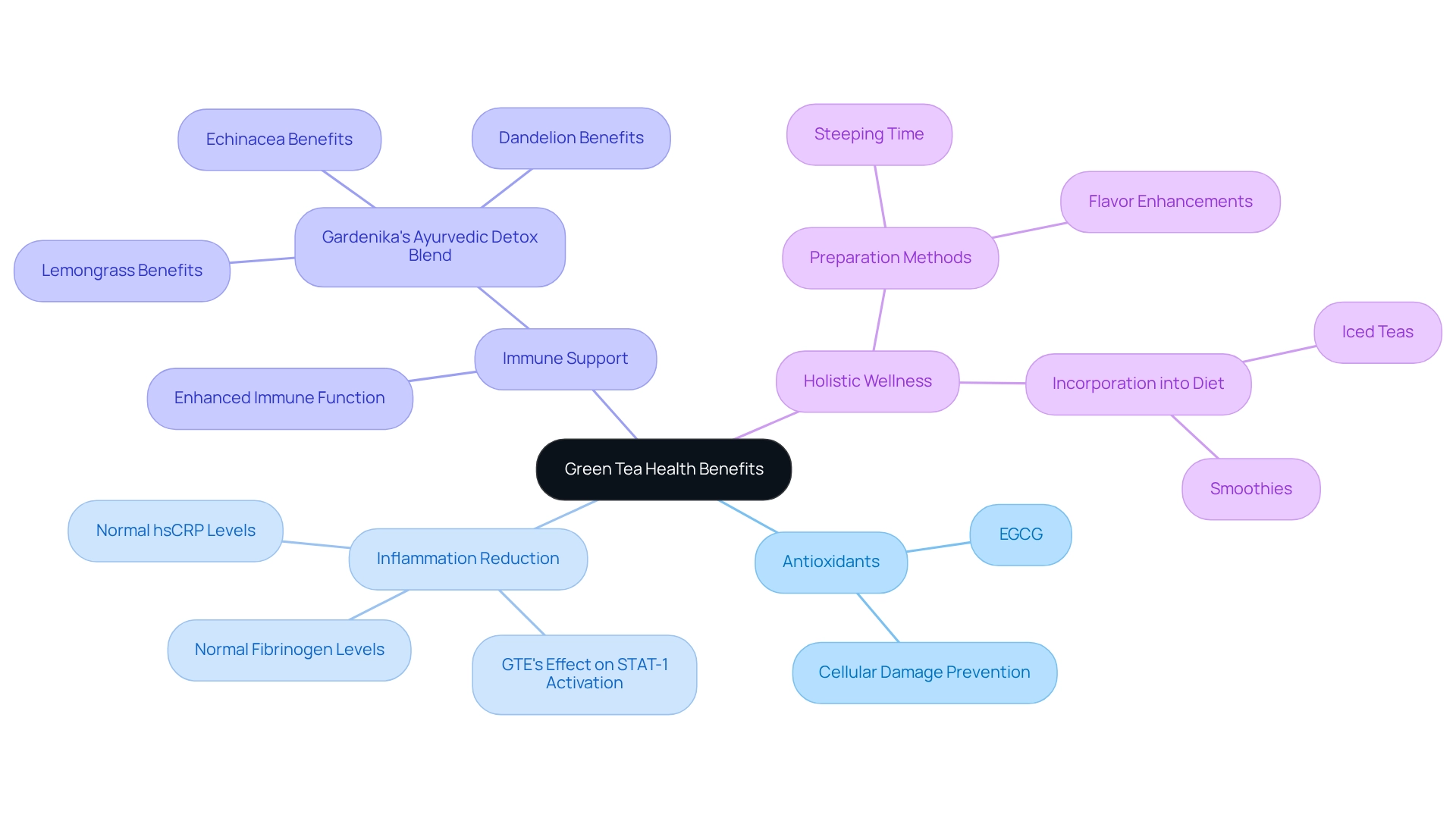
Marshmallow Root Tea: Soothing Throat Relief
Marshmallow root tea is cherished for its mucilage content—a gel-like substance that gently coats and soothes the throat. This makes it one of the best teas for alleviating congestion, especially for those experiencing irritation. Its soothing properties are particularly beneficial during the cold and flu season, helping to ease the discomfort associated with sore throats. To prepare marshmallow root tea, simply steep the dried root in hot water for 10-15 minutes, allowing the mucilage to infuse into the brew.
Research highlights the effectiveness of marshmallow root in addressing cough-related symptoms. A significant percentage of users report high satisfaction and tolerability, with studies indicating that 84.2% of parents would recommend marshmallow root products specifically for their soothing effects on throat irritation. This aligns with findings that emphasize the extract's role in providing relief from dry coughs and throat discomfort.
Experts attribute marshmallow root's calming effects to the polysaccharides that cover the irritated mucosa of the throat. Careen Fink, from the Phytomedicines Supply and Development Center at Bayer Consumer Health, notes the crucial role these polysaccharides play in alleviating throat discomfort. Moreover, case studies reveal that marshmallow root tea not only offers symptomatic relief for viral infections but also serves as a comforting home remedy during recovery from various throat-related ailments, as discussed in the case study titled "Understanding Sore Throat Causes and Treatments."
As current research continues to explore its health benefits, including ongoing studies on its effectiveness for throat irritation, marshmallow root tea stands out as a trusted natural solution for those seeking relief from throat discomfort. Why not consider adding this soothing tea to your wellness routine? It could be just what you need to feel better.
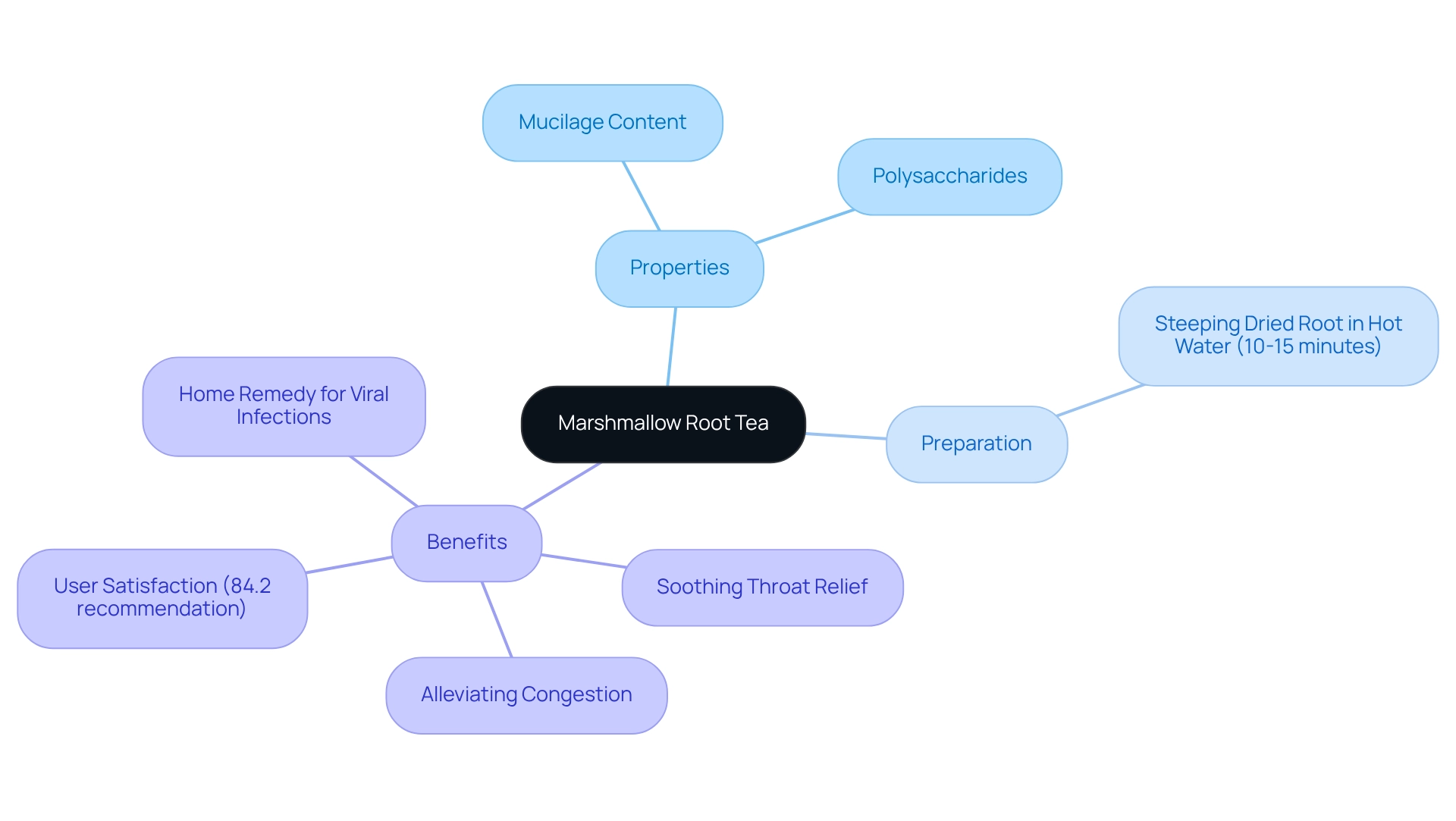
Slippery Elm Tea: Mucilage for Respiratory Comfort
Slippery elm tea, derived from the inner bark of the slippery elm tree, is cherished for its mucilage content, which gently coats and soothes the throat and airways. This remarkable property makes it especially helpful for alleviating coughs and throat irritation. To prepare slippery elm tea, simply mix the powdered bark with hot water and let it steep for several minutes. The resulting infusion can provide substantial relief during moments of breathing discomfort.
Research shows that the mucilage in slippery elm not only calms irritated mucosa but also stimulates the production of mucus and saliva, further easing throat dryness and irritation. A study focusing on patients with laryngeal complaints, upper respiratory infections, and voice problems emphasized the tea's effectiveness in offering symptomatic relief, reinforcing its role as a natural remedy for coughs.
Moreover, the active ingredients in slippery elm, including mucilages, tannins, and resins, contribute to its medicinal properties. These components help stimulate mucous and saliva production, providing relief for sore or dry throats while coating irritated mucosa. Experts highlight the importance of ensuring that the dosage of slippery elm in tea is adequate to achieve therapeutic effects. As Gans observes, "a question to consider is whether the amount of the herb is truly sufficient in the tea to gain the advantage."
With the growing interest in herbal remedies, particularly among health-conscious individuals, slippery elm tea is regarded as one of the best options for congestion, making it a preferred choice for those seeking natural solutions for breathing ease. However, it’s essential to be mindful of potential side effects and interactions, as understanding these factors can enhance care standards. As awareness of its benefits continues to expand, slippery elm tea is increasingly recognized for its potential to improve respiratory function and provide relief from coughs.
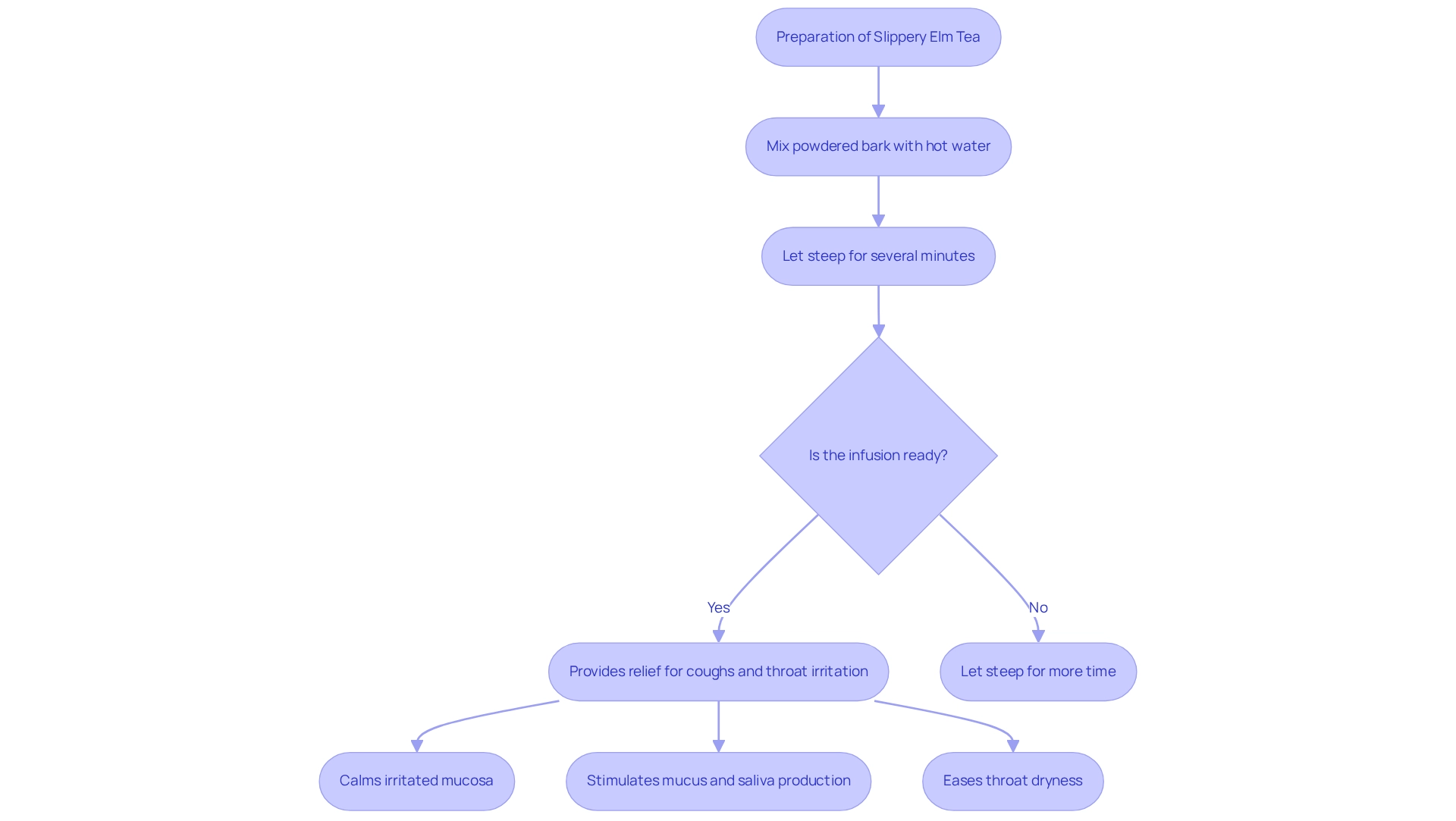
Lemon Tea: Refreshing and Soothing for Congestion
Lemon tea is not only refreshing; it’s a delightful way to support your health. Packed with vitamin C, it can help boost your immune system and fend off infections. Additionally, the acidity of lemon aids in breaking down mucus, making it easier to expel. To prepare this soothing tea, simply squeeze fresh lemon juice into hot water and add a touch of honey for sweetness. This tea is particularly beneficial for congestion and can be enjoyed at any time of the day to provide relief.
At Gardenika, we genuinely care about your wellness journey. We take pride in our commitment to quality and sustainability. Our organic loose leaf teas, crafted specifically for congestion relief, are both USDA Organic and KSA Kosher certified. This means you are choosing a product that not only benefits your health but is also responsibly sourced. Each batch undergoes third-party lab testing to ensure safety and quality, so you can trust every sip.
Imagine enjoying holistic wellness with our carefully selected ingredients, designed to support your immune system and promote relaxation. Why not take a moment to explore our offerings? Shop now and embrace the nurturing benefits of our teas!
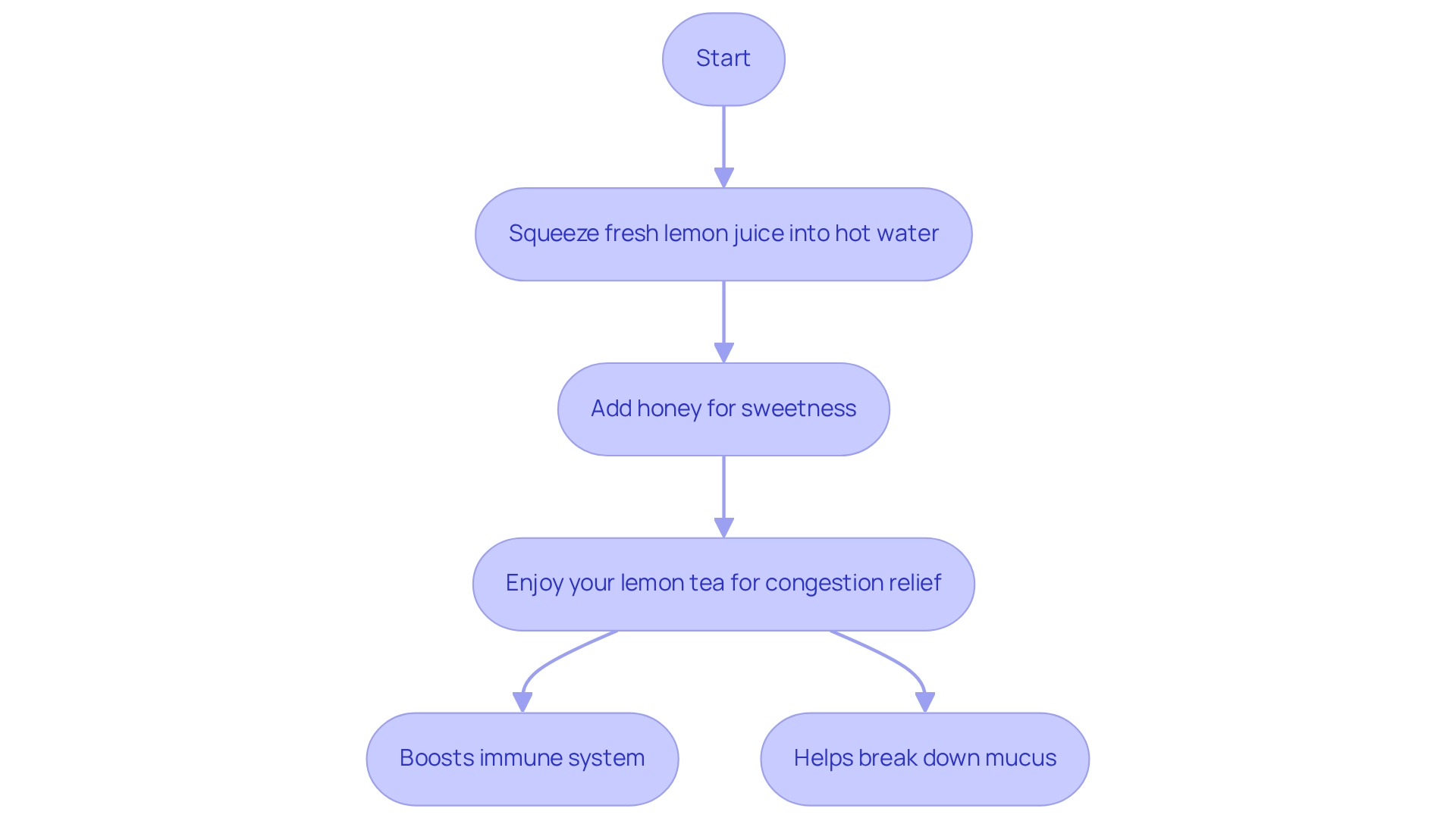
Conclusion
Herbal teas offer a wonderful range of benefits for respiratory health, providing natural remedies that can ease congestion and enhance overall well-being. Consider the soothing menthol properties of peppermint tea or the immune-boosting qualities of echinacea; each infusion presents unique advantages tailored to various health needs. Licorice root tea and slippery elm tea are particularly noted for their comforting effects on sore throats, while ginger tea and thyme tea provide powerful anti-inflammatory and antimicrobial support, respectively.
Preparing these herbal teas is straightforward, allowing anyone to easily incorporate them into their daily wellness routine. Whether you seek the calming effects of chamomile or the refreshing zing of lemon tea, these beverages not only offer immediate relief from respiratory discomfort but also contribute to long-term health benefits. With ongoing research backing their efficacy, herbal teas are increasingly recognized as essential components of a health-conscious lifestyle.
Incorporating these delightful brews into daily habits can truly transform your approach to managing respiratory issues. By embracing the healing properties of herbal teas, you can take proactive steps toward better respiratory health and overall wellness. The journey to discovering the perfect blend to support your personal health is not only enjoyable but also rewarding, inviting you to experience the soothing power of nature in every cup.
Frequently Asked Questions
What are the respiratory benefits of peppermint tea?
Peppermint tea is known for its menthol content, which acts as a natural muscle relaxant, helping to open up nasal passages and alleviate congestion from colds or allergies. It also reduces sinus pressure, making it effective for easier breathing.
What does recent research say about peppermint tea's effectiveness?
A randomized, double-blind, placebo-controlled trial involving 80 participants showed that peppermint tea significantly improved lung function and symptoms related to respiratory issues.
Besides respiratory health, what other benefits does peppermint tea offer?
Peppermint tea is also beneficial for digestion and enhancing focus, making it a versatile addition to wellness routines.
How can I prepare peppermint tea?
To prepare peppermint tea, steep fresh or dried peppermint leaves in hot water for 5-10 minutes.
What should I pay attention to after consuming peppermint tea?
It's recommended to note how you feel after drinking peppermint tea, as its beneficial effects can be noticeable within an hour of intake.
What are the benefits of licorice root tea?
Licorice root tea is known for its soothing properties that calm sore throats and reduce airway inflammation, making it helpful for breathing difficulties.
How is licorice root tea prepared?
To prepare licorice root tea, simmer the root in water for about 10 minutes.
What research supports the use of licorice root tea for sore throats?
Research, including a clinical trial, indicates that licorice root can significantly alleviate sore throat symptoms.
What are the anti-inflammatory properties of ginger tea?
Ginger tea contains gingerols, which are celebrated for their anti-inflammatory properties that help alleviate airway swelling and congestion.
How do you prepare ginger tea?
To prepare ginger tea, slice fresh ginger and steep it in boiling water for 10-15 minutes.
What additional benefits does ginger tea provide?
Beyond respiratory health, ginger tea may reduce joint inflammation and discomfort, particularly for arthritis patients.
What is the ongoing research focus regarding ginger tea?
Ongoing research continues to explore ginger tea's wellness advantages, particularly its role in alleviating congestion and inflammation.





